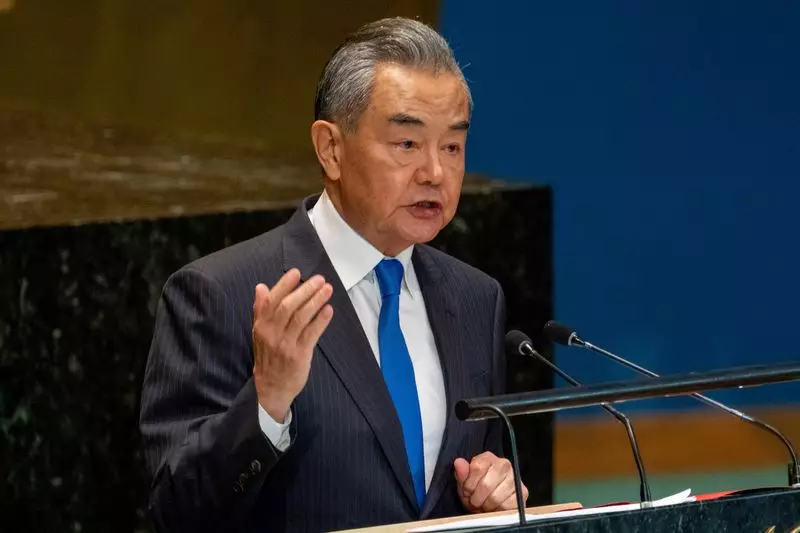The expanding influence of China in Africa continues to be a compelling narrative, particularly as Western powers seem to retreat and reassess their roles on the continent. Recently, China’s top diplomat, Wang Yi, commenced his annual diplomatic tour of Africa, a tradition that spans 35 years and underscores Beijing’s ambitions to bolster its engagement with resource-rich nations. This endeavor emphasizes China’s strategic positioning as a leader in Africa amid shifting global political landscapes, particularly in light of the uncertain presence of the United States and a diminishing European influence.
The consistency of China’s diplomatic engagement in Africa stands in stark contrast to the sporadic and sometimes unfocused approach of Western nations. As Wang Yi visits Namibia, the Republic of Congo, Chad, and Nigeria, he symbolizes China’s unwavering commitment to these partnerships, further solidifying relations that now stretch across multiple sectors, including trade, investment, and infrastructure. Analysts note that this diplomatic tour serves as a reminder of Beijing’s reliability and dedication to cultivating long-term relationships with African states amid the distractions faced by Western leaders concerning geopolitical crises in Ukraine and the Middle East, as well as domestic issues.
China’s strategy is not just about maintaining momentum but is also focused on enhancing its economic presence in Africa as global markets shift. With China’s own economy facing headwinds, African nations present lucrative opportunities for its state-owned enterprises, which are increasingly challenged by slowed domestic projects. By maneuvering into countries like Nigeria and Chad, Beijing seeks to tap into critical minerals and consumer markets, leveraging Africa’s potential as a space for surplus exports, from electric vehicles to solar technology.
The financial aspect of China’s involvement in Africa is significant. Last year’s summit resulted in a pledge from China to provide $51 billion in new financial assistance, which Wang’s visit seeks to enforce actively. This financial backing highlights China’s role as a key player in the international development landscape at a time when African nations grapple with debts, rising inflation, and economic instability.
Moreover, as local governments resist spending, China’s infrastructure investments offer a vital lifeline for projects that might otherwise be sidelined. This financial infusion isn’t merely altruistic; it serves to establish dependencies that can favor Chinese companies in future bids and contracts. With an eye on fostering economic ties, Wang’s diplomatic engagement reinforces the notion that Africa is not just a partner for consumption but also a vital collaborator in China’s broader economic aspirations.
The diplomatic discourse surrounding Wang Yi’s visit also reflects broader geopolitical objectives. With over 50 votes in the United Nations, Africa serves as a strategic ally for China in reshaping global governance norms and advancing its interests on the international stage. Influential figures, such as Hannah Ryder, argue that China’s role in Africa is profound, with Beijing regarded as both a model for growth and a source of inspiration for African policymakers.
As President Biden’s administration reflects on its approach toward Africa, marked by a singular visit to Angola, it becomes evident that China has capitalized on this comparative lacuna. The willingness of African Union candidates to acknowledge China’s contributions to education and manufacturing underscores a growing sentiment favoring alignment with Chinese investment, which is seen as more beneficial than the traditional Western models.
The overarching theme of Wang Yi’s African tour includes an increasing focus on regional security dynamics. His visit to Chad, particularly after France’s military withdrawal, signifies a shift in alliances that could allow China to extend its geopolitical reach through security cooperation. As China steps in to fill the void left by Western powers, this engagement signals a new chapter in which Beijing positions itself as a stakeholder in African security, potentially redefining existing frameworks.
Wang Yi’s visit and the consequent strategic objectives underscore a crucial moment for both China and Africa. The long-standing relationship, bolstered by historical consistency and marked by burgeoning economic ties, indicates a mutual commitment that could reshape the contours of international diplomacy moving forward. As Western nations reassess their strategies and commitments, China appears poised to further entrench its influence, leading to unprecedented transformations in the African landscape.

